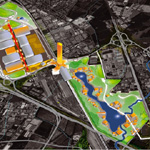Cities, Great Events and Mobility between global and local
Abstract
It is now a widespread opinion, mainly in administrative field, that the occasion given by great events would foster the competitive impulse of a city. On the contrary, many people affirm that the organization of great events would divert the attention and often hinder durable processes of re-qualification. This paper suggests a reading of the experiences related to the organization of great events in the cities all over the world, in order to define how and, eventually, how much the transformations of the city and, particularly, of the mobility system accomplished to support those events would have contribute, on the one hand, to increase the corporate fixed capital of each urban community and, on the other hand, to raise the competitiveness of the city to the international level. In the first part, the paper aims at identifying the role that the literature of the sector gives to the great events either in local ambit, in contributing to improve urban quality, or in global one, in helping increase the level of competitiveness. In the second part, the paper, by describing the real experiences carried out during the organization of great events in Italy and abroad, points out the urban transformations and those of the mobility system that have really contributed to the city re-qualification and to the increment of competitiveness.In the third part, the paper defines the role played by great events in the Strategic Plans of the big western cities and describes the perspectives of virtuous development related to Naples linked to the organization of the Forum of Cultures 2013, defined as banner project of the Strategic Plan.Downloads

Copyright (c) 2014 Tema. Journal of Land Use, Mobility and Environment

This work is licensed under a Creative Commons Attribution 4.0 International License.
Authors who publish in this journal agree to the following:
1. Authors retain the rights to their work and give in to the journal the right of first publication of the work simultaneously licensed under a Creative Commons License - Attribution that allows others to share the work indicating the authorship and the initial publication in this journal.
2. Authors can adhere to other agreements of non-exclusive license for the distribution of the published version of the work (ex. To deposit it in an institutional repository or to publish it in a monography), provided to indicate that the document was first published in this journal.
3. Authors can distribute their work online (ex. In institutional repositories or in their website) prior to and during the submission process, as it can lead to productive exchanges and it can increase the quotations of the published work (See The Effect of Open Access)
